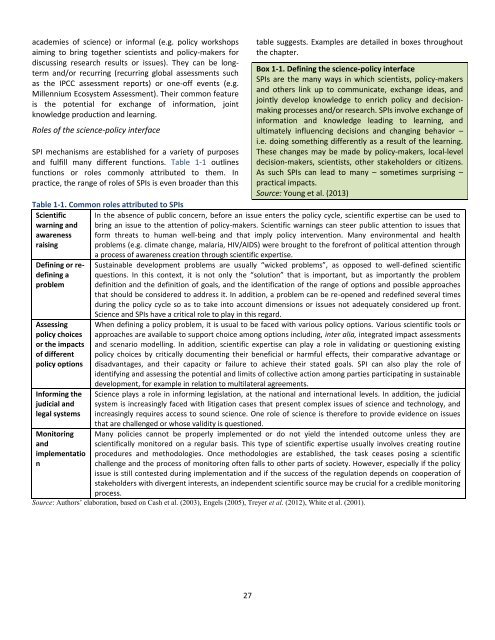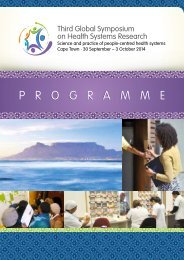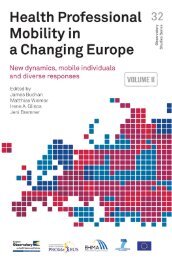Chapter 1.The Science Policy Interface1.1. Introduction: the science-policy interface forsustainable developmentMore than 20 years ago, the United Nations Conference onEnvironment and Development (Earth Summit) led to theadoption of a broad sustainable development agenda in theform of Agenda 21, which included an entire chapter onscience for sustainable development (chapter 35). Sincethen, there has been a significant increase of scientificresearch and publications on sustainable development andmore scientific evidence presented to policy-makers on thistopic 9 . Science has also become more integrated into policyefforts to promote sustainable development. 10The United Nations Conference on SustainableDevelopment (Rio+20 Conference) held in June 2012,recognized that while some progress had been made in theimplementation of sustainable development since the EarthSummit in 1992, implementation was still a challenge formany countries. Reasons for this lack of implementation lie,inter alia, in insufficient progress and setbacks in theintegration of the various dimensions of sustainabledevelopment (economic, social and environmental). Theestablishment of the United Nations high-level politicalforum on sustainable development (HLPF) was part of theresponse of the international community to this problem.Among other functions, the HLPF was given the task to“strengthen the science-policy interface through review ofdocumentation bringing together dispersed informationand assessments, including in the form of a globalsustainable development report, building on existingassessments” (The Future We Want, §85k). 11 This mandateforesees a space for discussions on the science-policyinterface in an intergovernmental UN forum dedicated tosustainable development. UN Member States will have todetermine how to structure this discussion, including whichtopics and issues should be covered and in what format.This chapter aims to inform this reflection by bringingtogether insights from the literature and practicalknowledge and expertise of scientific communities,development practitioners and experts of the sciencepolicyinterface. The chapter provides a menu of concreteroles and actions that the HLPF could consider in order tostrengthen the science-policy interface for sustainabledevelopment.1.1.1. Science for sustainable developmentLast year’s GSDR documented the emergence ofsustainability science over recent decades. 12 Sustainabilityscience has been described as “a field of research dealing26with the interactions between natural and social systems,and with how those interactions affect the challenge ofsustainability”. Sustainability science is primarily useinspired,as are agricultural and health sciences, withsignificant fundamental and applied knowledgecomponents, and with commitment to moving suchknowledge into societal action. Sustainability science iscarried out in all parts of the world and brings togethermany scientific disciplines. 13An integrated understanding of sustainable development isone of the prerequisites of science for sustainabledevelopment. Such integration calls for interdisciplinaryresearch, which entails integrating disciplines of the naturalsciences and the social sciences, and bringing togetherpeople and ideas from those disciplines to jointly frameproblems, devise methodological approaches and analyzedata. 14 Many sustainable development research questionsalso require integrating the humanities and the engineeringsciences, with their very different methods and traditions. 15The currently accepted paradigm for sustainabledevelopment science is that it also requires involving nonscientists– what is called transdisciplinarity.Transdisciplinarity combines interdisciplinarity andparticipatory approaches and requires reaching out tovarious communities and considering non-scientificknowledge (e.g. from local and indigenous communities,user groups, the general public, non-governmentalorganizations) in the research process. 16 Other necessaryconditions for science for sustainable development havebeen defined, inter alia, by the Scientific Advisory Board ofthe Secretary-General of the United Nations and includethe need to consider the social responsibility of science(e.g. being oriented towards societal goals and values), andto ensure ethically acceptable, sustainable and sociallydesirable innovation processes. 171.1.2. The science policy interface for sustainabledevelopmentDefining the science-policy interfaceThe science-policy interface (also referred to as SPI) is abroad concept for which various definitions and typologiesexist. SPIs cover a very wide range of structures,communication forums, situations and methods. 18 Forexample, they can be formal structures, designed for aspecific purpose (e.g. scientific advisory bodies ofinternational conventions, intergovernmental panels,scientific advisory boards, chief science advisors, national
academies of science) or informal (e.g. policy workshopsaiming to bring together scientists and policy-makers fordiscussing research results or issues). They can be longtermand/or recurring (recurring global assessments suchas the IPCC assessment reports) or one-off events (e.g.Millennium Ecosystem Assessment). Their common featureis the potential for exchange of information, jointknowledge production and learning.Roles of the science-policy interfaceSPI mechanisms are established for a variety of purposesand fulfill many different functions. Table 1-1 outlinesfunctions or roles commonly attributed to them. Inpractice, the range of roles of SPIs is even broader than thistable suggests. Examples are detailed in boxes throughoutthe chapter.Box 1-1. Defining the science-policy interfaceSPIs are the many ways in which scientists, policy-makersand others link up to communicate, exchange ideas, andjointly develop knowledge to enrich policy and decisionmakingprocesses and/or research. SPIs involve exchange ofinformation and knowledge leading to learning, andultimately influencing decisions and changing behavior –i.e. doing something differently as a result of the learning.These changes may be made by policy-makers, local-leveldecision-makers, scientists, other stakeholders or citizens.As such SPIs can lead to many – sometimes surprising –practical impacts.Source: Young et al. (2013)Table 1-1. Common roles attributed to SPIsScientific In the absence of public concern, before an issue enters the policy cycle, scientific expertise can be used towarning and bring an issue to the attention of policy-makers. Scientific warnings can steer public attention to issues thatawareness form threats to human well-being and that imply policy intervention. Many environmental and healthraisingproblems (e.g. climate change, malaria, HIV/AIDS) were brought to the forefront of political attention througha process of awareness creation through scientific expertise.Defining or redefiningaproblemAssessingpolicy choicesor the impactsof differentpolicy optionsInforming thejudicial andlegal systemsMonitoringandimplementationSustainable development problems are usually “wicked problems”, as opposed to well-defined scientificquestions. In this context, it is not only the “solution” that is important, but as importantly the problemdefinition and the definition of goals, and the identification of the range of options and possible approachesthat should be considered to address it. In addition, a problem can be re-opened and redefined several timesduring the policy cycle so as to take into account dimensions or issues not adequately considered up front.Science and SPIs have a critical role to play in this regard.When defining a policy problem, it is usual to be faced with various policy options. Various scientific tools orapproaches are available to support choice among options including, inter alia, integrated impact assessmentsand scenario modelling. In addition, scientific expertise can play a role in validating or questioning existingpolicy choices by critically documenting their beneficial or harmful effects, their comparative advantage ordisadvantages, and their capacity or failure to achieve their stated goals. SPI can also play the role ofidentifying and assessing the potential and limits of collective action among parties participating in sustainabledevelopment, for example in relation to multilateral agreements.Science plays a role in informing legislation, at the national and international levels. In addition, the judicialsystem is increasingly faced with litigation cases that present complex issues of science and technology, andincreasingly requires access to sound science. One role of science is therefore to provide evidence on issuesthat are challenged or whose validity is questioned.Many policies cannot be properly implemented or do not yield the intended outcome unless they arescientifically monitored on a regular basis. This type of scientific expertise usually involves creating routineprocedures and methodologies. Once methodologies are established, the task ceases posing a scientificchallenge and the process of monitoring often falls to other parts of society. However, especially if the policyissue is still contested during implementation and if the success of the regulation depends on cooperation ofstakeholders with divergent interests, an independent scientific source may be crucial for a credible monitoringprocess.Source: Authors’ elaboration, based on Cash et al. (2003), Engels (2005), Treyer et al. (2012), White et al. (2001).27
- Page 1 and 2: GLOBAL SUSTAINABLEDEVELOPMENT REPOR
- Page 3: ForewordIn September 2015, world le
- Page 6 and 7: 3.1. Interlinked issues: oceans, se
- Page 8 and 9: 7.2.1. Open call for inputs to the
- Page 10 and 11: Box 5-10. Operationalizing inclusiv
- Page 12 and 13: Figure 8-8. Location of ambulance u
- Page 14 and 15: Hentinnen (DFID); Annabelle Moatty
- Page 16 and 17: Friendship University of Russia, Ru
- Page 18 and 19: List of Abbreviations and AcronymsA
- Page 20 and 21: IRENAIRIISEALISSCITCITU-TIUCNIUUIWM
- Page 22 and 23: USAIDVPoAVSSWBGUWCDRRWEFWFPWMOWTOWW
- Page 24 and 25: Figure ES-0-1. Possible roles for t
- Page 26 and 27: Figure ES-0-2. Links among SDGs thr
- Page 28 and 29: increase either the availability or
- Page 32 and 33: Complex relationship between scienc
- Page 34 and 35: Communication between scientists an
- Page 36 and 37: 1.2.1. Highlighting trends and prov
- Page 38 and 39: International, Marine Stewardship C
- Page 40 and 41: limited. There is a relative dearth
- Page 42 and 43: educe the time lag between science
- Page 44 and 45: Chapter 2. Integrated Perspectives
- Page 46 and 47: 2.1.4. Recommendations by the Inter
- Page 48 and 49: ultimate idea is systems design - t
- Page 50 and 51: 2.2. Integrated SDG perspectives in
- Page 52 and 53: Hunger andagriculturePovertyWorld B
- Page 54 and 55: IIASA-GEAPBLSEIOECDRITE-ALPSFEEMGSG
- Page 56 and 57: Table 2-4. Number of models capturi
- Page 58 and 59: In order for oceans, seas and marin
- Page 60 and 61: fully integrated scientific assessm
- Page 62 and 63: While some efforts are undertaken t
- Page 64 and 65: Table 3-3. Impact of important clas
- Page 66 and 67: Marine pollution from marine and la
- Page 68 and 69: While the scientific coverage of th
- Page 70 and 71: managementinitiative in BancoChinch
- Page 72 and 73: equired, with natural and social sc
- Page 74 and 75: Table 4-1. SDGs and DRR linkagesSDG
- Page 76 and 77: poverty forces low-income household
- Page 78 and 79: Figure 4-1. Economic losses relativ
- Page 80 and 81:
OECD countries and, if they are ava
- Page 82 and 83:
4.3.4. Baseline setting and assessi
- Page 84:
Using assessed levels of risk as ba
- Page 87 and 88:
Table 4-3. Disaster management cycl
- Page 89 and 90:
New sensor data also includes unman
- Page 91 and 92:
Chapter 5. Economic Growth, Inclusi
- Page 93 and 94:
Table 5-1. Industrial policy waves
- Page 95 and 96:
Figure 5-3. Number of Y02 patents p
- Page 97 and 98:
increasingly production specific an
- Page 99 and 100:
5.3. Industrialisation and social s
- Page 101 and 102:
education will either make it hard
- Page 103 and 104:
Table 5-3. UNEP’s five key types
- Page 105 and 106:
5.6. Concluding remarksThe precedin
- Page 107 and 108:
occurs despite the lower share of e
- Page 109 and 110:
LLDCs face several development chal
- Page 111 and 112:
technology-innovation (STI) policie
- Page 113 and 114:
6.2.3. Relevant publications for LD
- Page 115 and 116:
- A patent bank would help LDCs sec
- Page 117 and 118:
In comparison to the Almaty Program
- Page 119 and 120:
Box 6-6. ASYCUDA and Landlocked Cou
- Page 121 and 122:
6.4.5. The landscape of SIDS relate
- Page 123 and 124:
Table 6-2. Example of science-polic
- Page 125 and 126:
Figure 6-9. Data availability for i
- Page 127 and 128:
Review Focusing on the Least Develo
- Page 129 and 130:
Table 6-5. Coverage of SDGs in publ
- Page 131 and 132:
- SYLWESTER, Kevin. Foreign direct
- Page 133 and 134:
SIDS:- UNCTAD. Improving transit tr
- Page 135 and 136:
Chapter 7.Science Issues for the At
- Page 137 and 138:
7.2.1. Open call for inputs to the
- Page 139 and 140:
implementation (SDG17), peaceful an
- Page 141 and 142:
percentage of women holding a leade
- Page 143 and 144:
environment, in order to make stron
- Page 145 and 146:
technology transfer. Respect for ea
- Page 147 and 148:
Figure 7-5. Concentrations of plast
- Page 149 and 150:
SDGs What is measured? Data source
- Page 151 and 152:
UN SystementityECLAC Drafted and re
- Page 153 and 154:
Figure 7-6 shows very wide ranges f
- Page 155 and 156:
Table 7-8. Factors that promoted or
- Page 157 and 158:
Chapter 8. New Data Approaches for
- Page 159 and 160:
These novel Internet- and SMS-based
- Page 161 and 162:
GabonNamibiaNigerSenegalRep CongoC
- Page 163 and 164:
Figure 8-5. Poverty map for Guinea,
- Page 165 and 166:
Figure 8-9. Map of internet connect
- Page 167 and 168:
Box 8-11. A geographical approach t
- Page 169 and 170:
There are many well established met
- Page 171 and 172:
epidemics. Some African countries a
- Page 173 and 174:
Figure 8-13. Data innovations cover
- Page 175 and 176:
issues” in respective areas of ex
- Page 177 and 178:
Notes1 United Nations, Prototype Gl
- Page 179 and 180:
51 Contributions sent by national l
- Page 181 and 182:
112 The 72 models are: AIM, ASF, AS
- Page 183 and 184:
201 For more information, please vi
- Page 185 and 186:
276 A. R. Subbiah, Lolita Bildan, a
- Page 187 and 188:
354 Information available at: http:
- Page 189 and 190:
African Economic Outlook, Structura
- Page 191 and 192:
512 Report Of The International Min
- Page 193 and 194:
595 Jessica N. Reimer et.al, Health
- Page 195 and 196:
671 Pulselabkampala.ug, 'UNFPA Ugan
- Page 197 and 198:
732 Climate Change timeline: (a) Sc
- Page 199 and 200:
790 Oxfam. ICT in humanitarian prac
- Page 201 and 202:
863 T. Dinku. New approaches to imp




